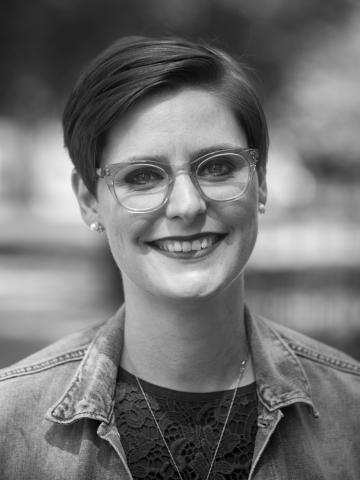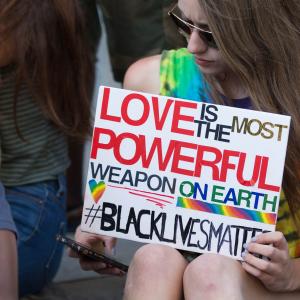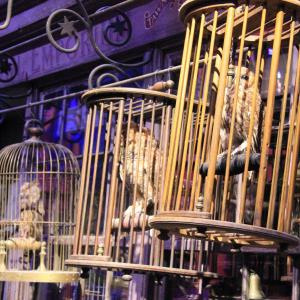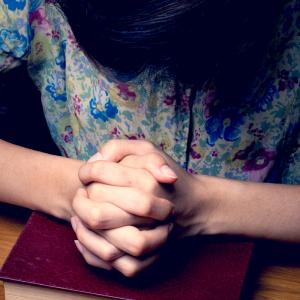
Layton Williams is the the author of Holy Disunity: How What Separates Us Can Save Us (WJK Press, Oct. 2019). She is a writer, focusing on intersections of faith, justice, politics, and culture with an emphasis on sexuality and gender. In addition to Sojourners, her work has been published by Religion Dispatches, Believe Out Loud, Reconciling Ministries Network, and Presbyterians Today, among others.
Layton previously served on the Sojourners staff. Before that, she served as the Pastoral Resident at Fourth Presbyterian Church in downtown Chicago. She grew up in Atlanta, then lived in Austin, Texas, for six years where she served as an AmeriCorps volunteer and nonprofit educator prior to attending seminary. She holds a B.A. in English from the University of Georgia and an M.Div from Austin Presbyterian Theological Seminary. She was ordained as a minister in the Presbyterian Church (USA) in 2014.
Beyond the realms of faith, justice, and writing, Layton’s interests include improv, pop culture trivia, travel, and discovering new passions. Find her on Twitter at @LaytonEWilliams.
Posts By This Author
How Can Survivors of Abuse Survive This Election Season?

Image via d13/Shutterstock.com
And as a survivor, I find that I don’t want to pull away. I don’t want to go back to the world where I silently carry around an explosive secret and nobody ever talks about it.
This is our moment. Ready or not. We have been steeped in rape culture — facing an epidemic of misogynistic violence — for a long, long time. The time has come for our society to reckon with it. And I don’t want us to look away. I don’t want us to be complacent for one second more.
How Big Is Your Beloved Community?
“Beloved Community” is a term first coined by American philosopher Josiah Royce in the early 20th century, later popularized by Dr. Martin Luther King, Jr., in reference to his goal of communal justice. It has since become a popular phrase in progressive faith circles, emphasizing radical inclusion fully liberated from the prejudices and discriminations of this broken world. Often, churches describe the work of justice as “building the Beloved Community.”
Citing both her Unitarian Universalist tradition and her upbringing as a child of a white Mormon mother and black academic father, Harris-Perry said, “I believe in a God that wants me to ask a lot of questions.”
On Allyship and Fear of Failure

Image via betto rodrigues/Shutterstock.com
The reality of our privilege is that it makes many truths of systemic injustice unclear to us. We fumble around with murky awareness and bump into our own ingrained racism and ignorance. As allies, the question for us is not if we will screw up, but how we will move forward when we inevitably do.
What ‘Harry Potter’ Taught Me About Working for Justice

Image via Karen Roe/Flickr
In this new tale, Harry is a little bored, a little uninspired, and a little wistful for the good old days. A decade or so into my own adulthood and a few difficult years into ministry, advocacy, and activism, I have also struggled a bit with the transition from childhood adventure to the mature, painstaking reality of real work of justice.
Who Cares About Church Unity
While I am a vocally liberal, bisexual justice-seeker and activist, my mom is an engaged and informed lifelong conservative who believes our denomination’s political engagement contradicts the separation of church and state. For this reason, I knew that the historic votes on marriage and several other progressive issues would not be good news for her. In fact, I knew that the senior pastor of her congregation — the church I had grown up in — would leave the denomination over those votes, and that my mom might well be leaving too. Across the vague static of our cell connection, I heard the emotion in her voice as she admitted, “I just feel like my church is leaving me behind.” I shook my head, thinking to myself, “But we don’t want to.” Church had always been a shared home for us, but I wondered if we would ever both feel home in the same church again.
Who Owns a Pastor’s Body?
Clergy have long been expected to be paragons of piety and purity. As public religious figures, we’re assumed to represent the moral ideal — an example for others to follow — and as a result, we become archetypes rather than human beings. We are measured up against an image of what a perfect Christian pastor should look like.


